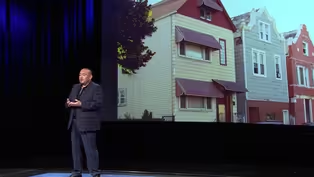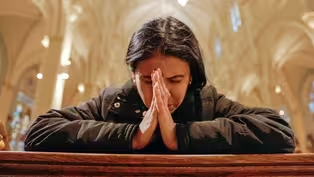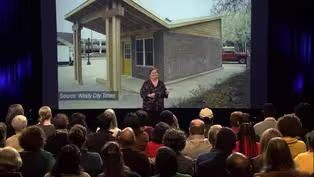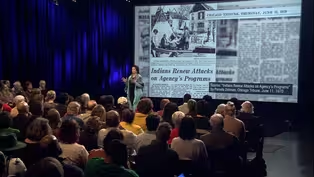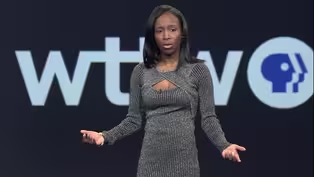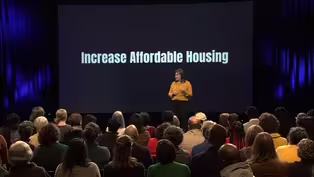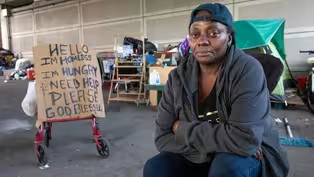FIRSTHAND
FIRSTHAND Talks: The Power of Housing
Clip: Season 6 | 7m 39sVideo has Closed Captions
Jose Muñoz shares his childhood experience facing homelessness and food insecurity.
Jose Muñoz shares the story of his childhood living in an undocumented family in the Back of the Yards neighborhood of Chicago facing homelessness and food insecurity.
Problems playing video? | Closed Captioning Feedback
Problems playing video? | Closed Captioning Feedback
FIRSTHAND is a local public television program presented by WTTW
FIRSTHAND
FIRSTHAND Talks: The Power of Housing
Clip: Season 6 | 7m 39sVideo has Closed Captions
Jose Muñoz shares the story of his childhood living in an undocumented family in the Back of the Yards neighborhood of Chicago facing homelessness and food insecurity.
Problems playing video? | Closed Captioning Feedback
How to Watch FIRSTHAND
FIRSTHAND is available to stream on pbs.org and the free PBS App, available on iPhone, Apple TV, Android TV, Android smartphones, Amazon Fire TV, Amazon Fire Tablet, Roku, Samsung Smart TV, and Vizio.
Providing Support for PBS.org
Learn Moreabout PBS online sponsorship(upbeat music) (audience clapping) - Growing up, my mother was a sole provider for our family.
She came to this country from Mexico to build a better life.
A single undocumented mother with eight children, she settled in the back of the yards neighborhood.
(Jose speaking in foreign language) I was born here, with all the rights and privileges of a US citizen, but that doesn't mean much when the rest of your family's undocumented.
We were vulnerable.
Homelessness and food insecurity dominated every decision we made.
At an early age, my life trajectory was leading to a place as a young adult where I was either gonna end up dead, or I was gonna end up in jail.
My mom worked tirelessly.
She was one of the hardest workers you're ever gonna meet.
Working multiple jobs to keep a roof over our head, taking low paying jobs sometimes from employers who would steal her wages.
We were vulnerable.
As a kid, I didn't understand it, but I could feel it.
The anger and the frustration of working so hard and yet still having trouble keeping a roof over our heads.
The shame of when we had to move out of our home because we had nowhere else to go.
The evictions or the periods of time when we lived with other people, doubling up is what they call it.
Living with people that were struggling just as much as we are.
That never ended well.
But the worst times were those times where we had to live out of my mother's car.
Those were the scariest.
With all the moves, we lost a lot.
Relationships with friends and family, pictures, mementos, things that people use to define who they are as a family.
Memories.
You lose a piece of your identity when you lose those things.
They weren't just possessions.
They were a part of our history.
They were a part of who we were, and they were things that we could no longer hold onto.
Fast forward, I'm 20 years old, living a lifestyle that mirrored the instability of my youth.
Now remember, I'm an American citizen.
You would think that being born in this country would give you an advantage to live a more stable life.
But I was on the same path that my mom was on when she was younger.
Working multiple jobs, struggling to keep a roof over our head, a life of instability.
And I say our, because by this time I'm a father.
I was in a tailspin, constantly struggling between the envision future that I wanted and having to provide for me and my daughter in real time.
During one of my lowest points, where I was really struggling.
I was blessed to reconnect with my father, who lived alone and offered me an opportunity to stay with him.
It wasn't the best home, it wasn't the nicest home, it wasn't the greatest neighborhood, but it was a home.
Up until then, I was in survival mode, which is what many unhoused people have to deal with.
But finally having a roof over my head and not having to worry about where my next meal was gonna come from, I had the opportunity to really think about the future.
I went back to school.
It took me over a decade, but I eventually got my life together.
Graduated college, built a career, and finally had the opportunity to be able to plan a future, a real future for me and my daughter.
That's the power of housing.
Unfortunately, that first half of my life is very common for many Chicagoans.
Being undocumented, living in poverty, having to worry about a roof over your head, or where your next meal is gonna come from.
Being in that state of survival, it is a very difficult place to be.
When you're in survival mode, you can't plan for the future.
All you could think about is where your next meal is gonna come from or what you're gonna do next to protect yourself and keep yourself safe.
For many that struggle is repeated generationally.
As we look for solutions, I think there are two that could have an immediate and sustainable impact, on the issue of homelessness.
Permanent supportive housing and work permits for all.
Permanent supportive housing is affordable housing with financial support and the wraparound services to be able to help an individual and a family thrive and escape homelessness.
It provides the most vulnerable in our society with the tools and the resources and the support to be able to heal from the trauma of being homeless and living in poverty.
For the undocumented, there's even more difficulty in trying to get an apartment.
Having to prove stable income when you're getting paid in cash, a security deposit of one month's rent when you're living check to check.
Or a credit score when you don't even exist on paper.
That's why we have to expedite work permits for all to give people an opportunity to earn a wage.
In many Latin American countries, migrant labor doesn't have to have permission to work.
If you can work, the rule is work.
Many cities and many states across the country are pushing Washington to pass work permits for all, including Chicago.
The dignity of work is essential for the prosperity of our country.
That's why organizations at La Casa Norte are so important and why the work they do to help youth and families break outta that cycle of homelessness is so near and dear to my heart.
The second half of my life is less common.
That's why I've dedicated my life to flipping that script, to giving people the opportunity to be able to thrive.
Imagine a Chicago where every person has a safe place to call home, where everyone has a roof over their head and doesn't have to worry about where their next meal is gonna come from.
And more importantly, a Chicago where every young person has the tools to be able to thrive.
That dream is achievable.
It's a reality that can come true when we work together.
When we prioritize housing, and we say that housing is a human right and we invest in housing, in young people, in communities, we can create the city that we all can be proud of.
A city where everybody can thrive and everybody has the opportunity to succeed.
Home is where the heart is, charity begins at home.
Mi casa su casa, that's what guides my life's work, a commitment to each other, to collective progress, to ensure that nobody is left behind.
Building a world where everybody has an opportunity to succeed with dignity and hope.
Whereas my mom would say, (speaks in foreign language) to get ahead in life.
Together, we can transform lives, transform communities, and build a Chicago where everyone has a home.
That's the power of housing.
Thank you.
(audience clapping) (soft music)
FIRSTHAND Talks: The Power of Housing
Video has Closed Captions
Clip: S6 | 7m 39s | Jose Muñoz shares his childhood experience facing homelessness and food insecurity. (7m 39s)
FIRSTHAND: Homeless — The Migrant Experience Trailer
Preview: S6 | 29s | WTTW shares five migrant stories, revealing why they left home, their journeys, and their struggles. (29s)
FIRSTHAND Talks: Tiny Homes, Big Solutions
Video has Closed Captions
Clip: S6 | 9m 34s | Tracy Baim examines the use of tiny homes one possible solution to homelessness. (9m 34s)
FIRSTHAND Talks: Invisible No More
Video has Closed Captions
Clip: S6 | 8m 43s | Shelly Tucciarelli explores affordable housing development for Native Americans. (8m 43s)
FIRSTHAND Talks: Finding a Way Home
Video has Closed Captions
Clip: S6 | 5m 21s | Sharday Hamilton shares how public services failed her as a homeless teen mother. (5m 21s)
FIRSTHAND Talks: Building Our Way Out
Video has Closed Captions
Clip: S6 | 9m 20s | Nicole Bahena puts focus on using available funding to create affordable housing. (9m 20s)
Video has Closed Captions
Preview: S6 | 1m 19s | WTTW offers a look at the unique perspectives and challenging experiences of the unhoused. (1m 19s)
Providing Support for PBS.org
Learn Moreabout PBS online sponsorshipSupport for PBS provided by:
FIRSTHAND is a local public television program presented by WTTW
